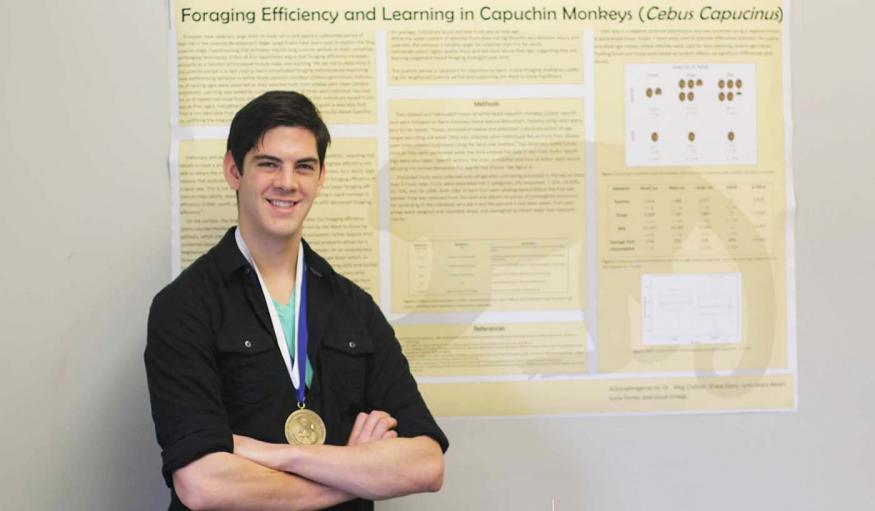
Why don't these monkeys grow up faster?
Dan Herrera ’17 spent 10 weeks last summer working on Barro Colorado Island, Panama, studying the foraging behavior of white-faced Capuchin monkeys. Funded by the National Science Foundation (NSF), the program’s researchers wanted to understand the evolutionary reasoning behind the prolonged juvenile stage in primates.
“Our results support the hypothesis that primates have long juvenile periods to learn complicated foraging techniques, which results in a higher intake of calories, which supports a larger brain size, and further increases the capacity to learn complex foraging techniques,” said Herrera, who is majoring in biology and environmental studies.
Herrera won first place in the undergraduate division for his poster on his research with monkeys at the national Sigma Xi scientific honor society meeting.
“It goes in a loop that we believe has been occurring for thousands of years bringing us to where we are today.”
NSF-sponsored summer programs give students from less research-focused institutions a chance to study with faculty and researchers from some of the country’s top research institutions. In Panama, Herrera worked under University of California-Davis Ph.D. candidate Grace Davis.
“These are extremely competitive programs, and Dan’s excellent background and training at Augustana helped open that door for him,” said Dr. Kevin Geedey, chair of the natural science division at Augustana.
Then Herrera did what no other Augustana student has done, or at least that anyone on campus can remember. He won first place in the undergraduate division for his poster on his research with Capuchin monkeys at the national Sigma Xi scientific honor society meeting. He competed against science students from research universities 15 times the size of Augustana.
“Dan came here his first year ready to go,” said Stephanie Fuhr, Herrera’s Senior Inquiry advisor. “He capitalized on all the research opportunities here, networked with multiple faculty members and then used his stellar résumé to get into a prestigious research program off campus.”
Herrera now is conducting literature reviews and searches in hopes of writing a publishable manuscript before he graduates in May. After graduation, he wants to take a gap year, most likely to work for a research station somewhere in the world. Then he will pursue a Ph.D. in wildlife ecology.
“My research interests are an overlap of urban ecology, animal behavior and biogeography,” Herrera said. “My long-term goal is to research why some animals are in cities while others aren't, where animals are within cities, and what factors play into that.”
